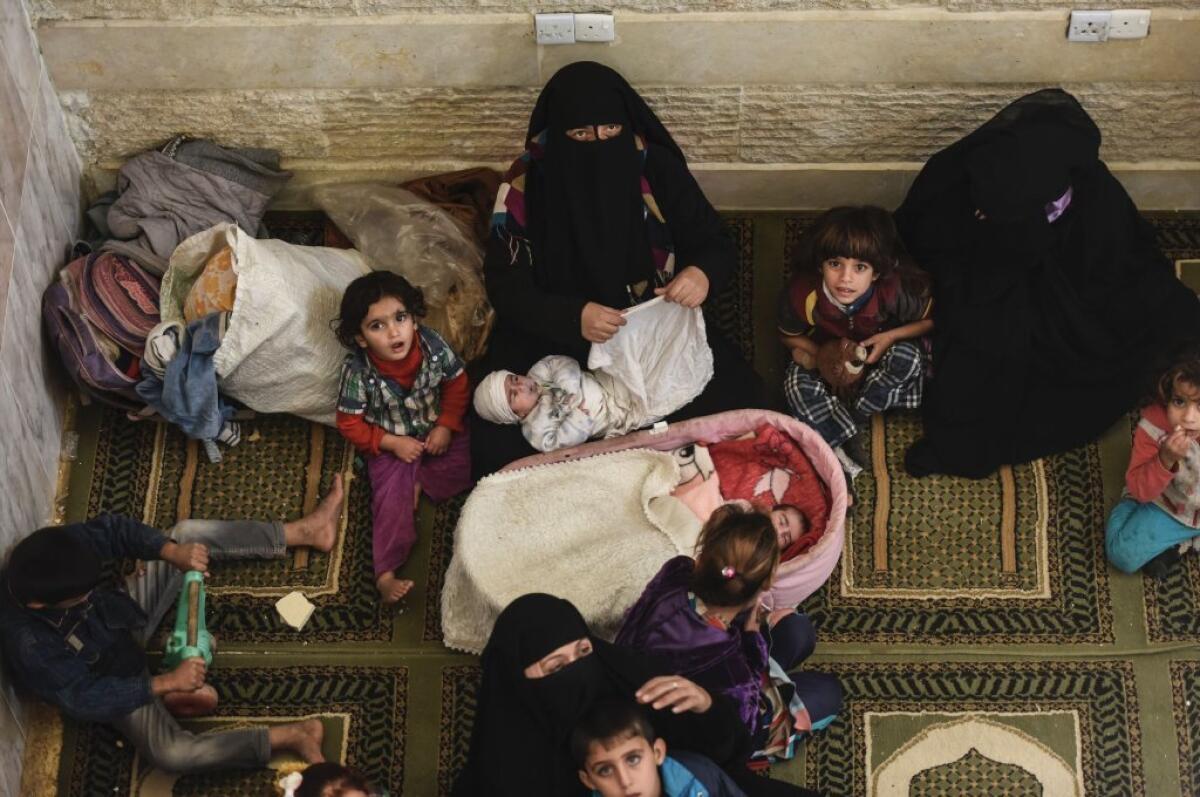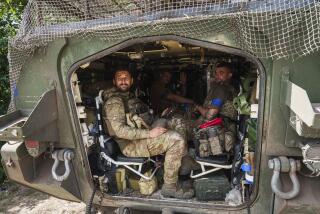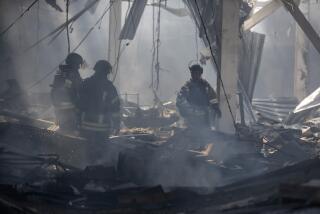Russia portrays its Aleppo bombing as a Mosul-style offensive

Reporting from Washington — Russia says its bombing of schools, hospitals and civilians in the Syrian city of Aleppo is no different than the U.S.-backed offensive on the Iraqi city of Mosul, a charge U.S. officials fiercely deny.
The tit-for-tat is the latest sign of the downward spiral of U.S.-Russian relations over conflicts in Syria, Ukraine and cyberspace.
For the record:
11:49 a.m. Nov. 16, 2024An earlier version of this article incorrectly gave the name of a Russian Defense Ministry spokesman as Maj. Gen. Igor Konashenko. His last name is Konashenkov.
U.S. officials bristle at the comparison between the Russian-backed siege of Aleppo and the U.S.-backed attempt to free Mosul from Islamic State.
They are quick to point out major differences — even as some similarities are obvious.
Moscow is backing Syrian President Bashar Assad’s attempts to crush what both call terrorist groups in Aleppo, the largest city still partly under rebel control in Syria’s civil war.
Washington and its allies are backing an Iraqi-led ground offensive aimed at dislodging Islamic State from Mosul, the largest city under that group’s control.
An estimated 275,000 civilians are believed to be trapped in eastern Aleppo. An estimated 1 million Iraqis may be stuck in Mosul. Militants have blocked their escape in both cities.
But unlike in Aleppo, where Syrian and Russian attacks have caused heavy civilian casualties over the last year, the Pentagon and the United Nations said they have no confirmed civilian casualties from coalition attacks in the Mosul offensive that began two weeks ago.
“We keep hearing ‘Aleppo, Aleppo, Aleppo,’” Russian President Vladimir Putin groused last week at the Valdai Discussion Club conference, a meeting of leaders and intellectuals held annually in Russia.
“Do we leave the nest of terrorists in place there, or do we squeeze them out? … If it is better to not go in at all, then the offensive against Mosul shouldn’t go ahead at all either.”
U.S. officials say Russia refuses to distinguish among the insurgents in Aleppo. They say some — such as the Syrian branch of Al Qaeda once known as Al Nusra Front — are legitimate targets.
But fighting along with them, the U.S. contends, are more moderate rebels who oppose Assad’s continued rule and should be supported, not wiped out.
“It’s radically different,” State Department spokesman John Kirby said when asked about the two offensives. “Any comparison is absolutely insulting.”
While Mosul has been “under the jackboot” of Islamic State for about two years, Kirby said, the “moderate opposition groups” in Aleppo that far outnumbered the Al Qaeda-linked fighters were “working on behalf of the Syrian people, the Syrian citizens of Aleppo, to try to free them from assault ... by their own government.”
The Obama administration argues that, unlike Russia, the U.S. military has taken extensive precautions to avoid targeting civilians and has worked closely with U.N. agencies to aid those who manage to escape the fighting.
Russia claims it avoids attacking civilians in Aleppo and has suspended air attacks on the city for the last two weeks.
But barrel bombs, heavy artillery and other indiscriminate weapons have killed thousands, including children, in homes, schools and hospitals, the U.S. government maintains.
Secretary of State John F. Kerry has said Russia should be investigated for possible war crimes in Aleppo. U.N. officials also have warned of possible war crimes in some of the attacks.
To deflect the criticism, Russia accused the United States and its allies of killing civilians as Iraqi ground forces, backed by U.S. airstrikes, breached defensive lines on Mosul’s east and began to move into the city this week.
“Bells are tolling for those who have been killed in Aleppo,” Putin said. “Bells should also be tolling for those now losing their lives in Mosul and its vicinity.”
Defense Ministry spokesman Maj. Gen. Igor Konashenkov went further Wednesday, saying that Russian forces have provided better care for the trapped civilians than U.S. forces.
He said Russia and Syria have set up six “humanitarian corridors” to allow aid groups to deliver food and supplies to Aleppo, and to allow residents, including fighters, to leave.
By contrast, Konashenkov said, the U.S.-led coalition is forming an “iron ring of encirclement” around Mosul that entraps everyone.
U.S. officials say the Iraqis have deliberately left a wide gap on the west of the Mosul for people to flee, and have set up refugee camps around the city to accept and assist those who do.
Anti-Assad activists contend that some of the corridors are aimed at depopulating rebel-held areas to make it easier for Assad to recapture the city.
At the State Department, Kirby vigorously disputed Russia’s claims of indiscriminate U.S. bombing. When a U.S. airstrike mistakenly hits civilians, he said, the U.S. military owns up to it, investigates and announces the results, unlike “virtually any other military in the world.”
In briefings with reporters, especially those from other countries, Kirby and other administration officials are increasingly put on the spot and asked to explain the differences between the attacks in Mosul and Aleppo.
“Every member of the coalition, as we prosecute the campaign on Mosul,” Kirby said, “will be mindful of doing this in a way that is in accordance with international law and observes the basic human rights of the innocent people of Mosul, something else that is not happening in and around Aleppo. OK?”
For more on international affairs, follow @TracyKWilkinson on Twitter
More to Read
Sign up for Essential California
The most important California stories and recommendations in your inbox every morning.
You may occasionally receive promotional content from the Los Angeles Times.











